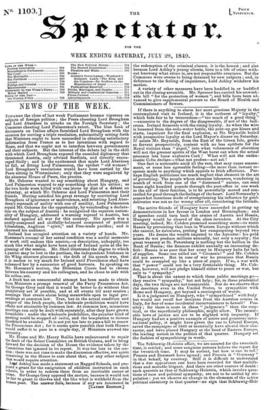If there is anything to alarm her most gracious Majesty
in the contemplated visit to Ireland, it is the outburst of "loyalty," which bids fair to be tremendous—" too much of a good thing" —excessive to the degree of the disagreeable, if not of the ludi- crous. Ireland ferments with the rising loyalty. As when the wire is loosened from the soda-water bottle, the pent-up gas hisses and starts, impatient for the final explosion, so Mr. Reynolds boiled with prospective loyalty at the Lord Mayor's dinner on Saturday. If astute Mr. Reynolds, from the East of the Green Isle, grows so fervent prospectively, content with no less epithets for the Royal visitant than "angel," into what vehemence of elocution will not the greener spirits of the West burst out when the actual presence lets loose explosive Cork ? What will not the enthu- siastic Celts declare—what not profess—not ask?
One fact is noticeable amid all the rest, that may cause amuse- ment, or some less agreeable feeling—the more than instant re- sponse made to anything which appeals to Irish affections. Per- haps English politicians too much neglect that element in the art of governing. The people whose absentee labourers, wandering in search of work from one of the " distressed " unions, can send home eight hundred pounds through the post-office in one week to the aid of their families, is to be powerfully moved and con- trolled for good through the feelings of the heart. Lord Normanby's somewhat licentious mode of strengthening his influence by gaol- deliveries was not so far wrong after all, considering the latitude.


























